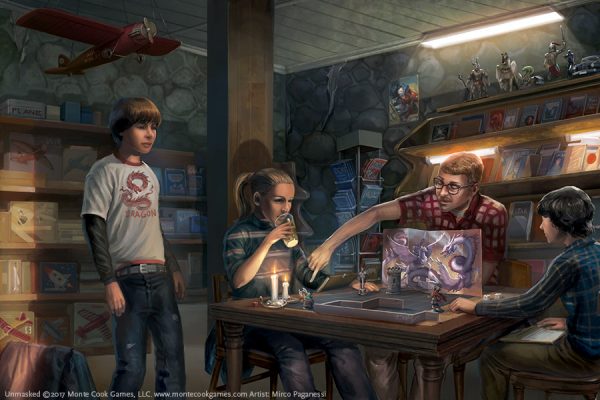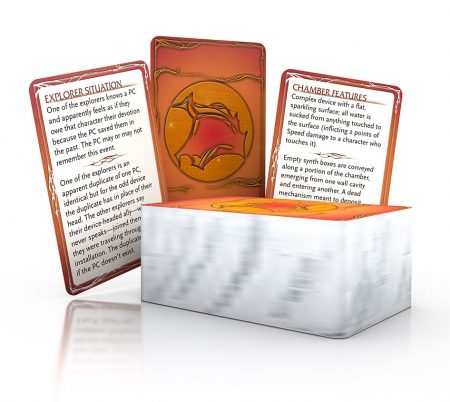My introduction to roleplaying was the D&D Basic Set (blue box), which I got for Christmas of 1979. Within a month or two I’d scrounged and saved enough money to buy the first-edition AD&D Dungeon Master’s Guide—$15 in 1980!—followed by the Player’s Handbook and Monster Manual. In the years (decades) since, I’ve amassed a collection of RPGs that makes multiple bookshelves groan, and that doesn’t count the hundreds of games I’ve purged from my collection over the years, due simply to lack of space.

Like that first Christmas gift, a few of my RPG titles are boxed sets. And I have loads of dice, and a few accessories like battle mats and Dwarven Forge terrain. But overwhelmingly RPG products are books. That’s been the tradition since the original hardcover D&D Player’s Handbook came out back in 1979, and it remains true today and into the foreseeable future.
There are good reasons why books (physical or PDF) are the best way to organize and deliver most RPG content, and we here at MCG produce a lot of books. But is every RPG need best served by the book format? We’ve never been beholden to that idea, and have always looked at different ways of doing things. One format that’s served us well has been the deck.
We make a bunch of decks: cypher decks, creature decks, XP decks, the Intrusion Deck and Weird Deck and NPC Deck. In the Numenera 2 Kickstarter campaign, we’re currently working toward a stretch goal that will unlock the Ruin Deck. Why so many decks?

Here’s why:
- When you want a random thing, a deck is so much faster than rolling on a table. Consider: Take out the book, find the right page, roll some dice, look up the result. Or pull out the deck and draw a card. As a GM, a deck makes prep much faster—and it really speeds things up at the gaming table.
- In some cases, you can mix and match card elements to get far more results than a table could ever deliver. The NPC Deck, for example, contains 100 cards—but you can draw several, and use the description from one, the quirk from another, and the name from a third to define your NPC. Now you have literally millions of possible results!
- In a book, a random table is fully defined. You can’t make it any longer, and you can’t remove items you don’t like (though I suppose you can always ignore some results and reroll). But you can always add new cypher cards to your Numenera Cypher Deck (and even make your own with the Numenera Card Creator at DriveThruRPG). Or build a custom Creature Deck using only the creatures you want. Heck, you can even mix and match creatures from the Numenera Creature Deck, The Strange Creature Deck, and the forthcoming Cypher System Creature Deck if you want!
- Speaking of creature decks, each creature card gives you an image on one side with stats on the other. Which makes it much easier to show your players than awkwardly trying to hold up a book while blocking the stats with one hand.
- And in the case of cypher cards, you can hand the card to your player, who can keep it with their character sheet until the cypher is used. Much easier than hastily scribbling down cypher effects, only to erase them a few hours later!
So decks are great for randomizing things. And they’re fast, and the cards are portable. But I think perhaps my favorite thing about our decks, as a GM, is the inspiration they provide. It’s great flipping through the Weird Deck when dreaming up encounters for my next Numenera session. It’s even better to be able to draw a card from the Intrusion Deck when my player rolls a 1 and I just can’t come up with a clever GM intrusion on the fly. (Intrusions are like snappy comebacks: You always think of the perfect one about 10 minutes too late.) I may not actually use the result the card gives me. In fact, my favorite thing isn’t to draw just one card. Instead, I draw two or three, and suddenly my head is in the right space to generate its own ideas.
I’m looking forward to the Ruin Deck. It’s based on the Numenera Ruin Mapping Engine (in Jade Colossus: Ruins of the Prior Worlds), an awesome GMing tool. Building on that tool and adding all the versatility and ease-of-use of a deck is going to make it that much better!